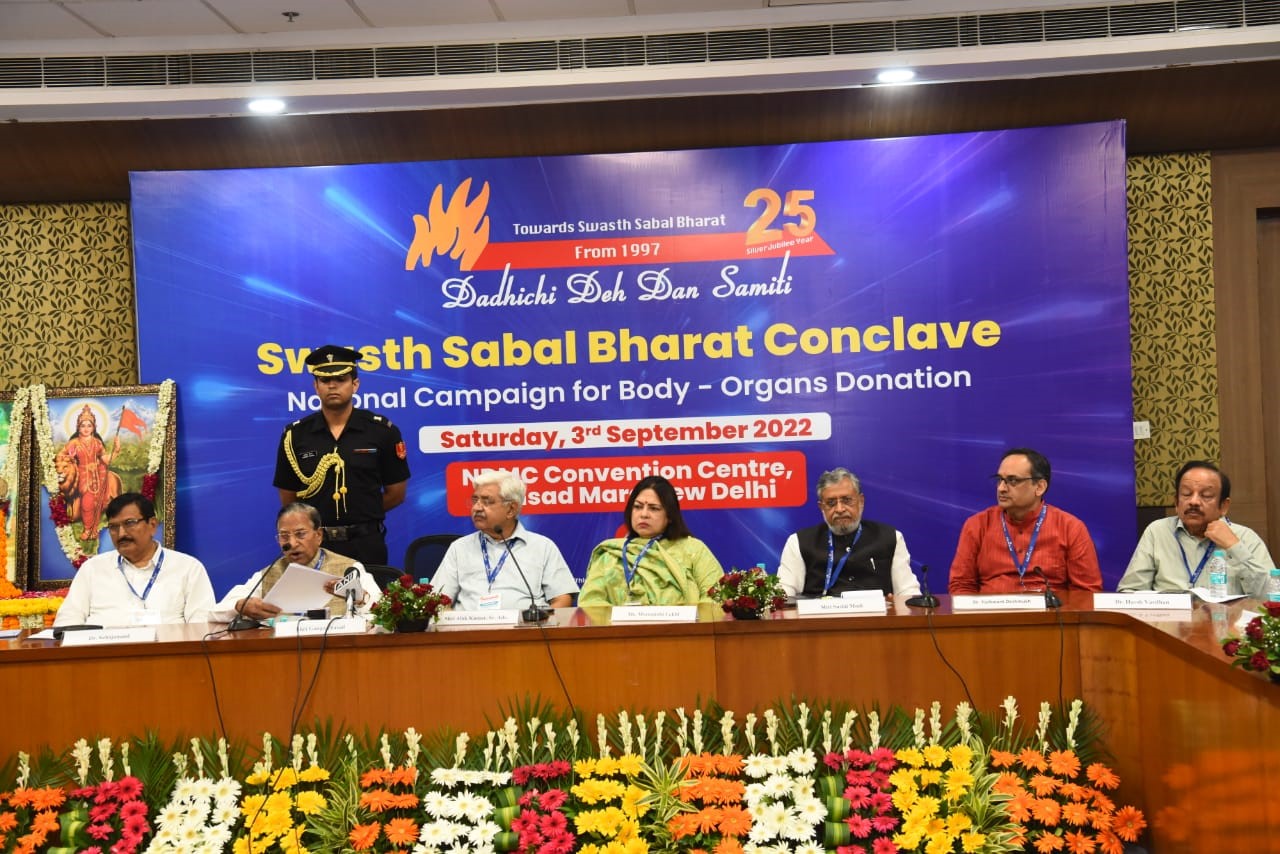Key points of 'Swasth Sabal Bharat' conclave

‘Swasth Sabal Bharat’ conclave held on September 3-4, 2022 organized by Dadhichi Deh Daan Samiti (DDDS) was well attended by all the important stakeholders working for the cause of organ and body donation. The conclave was inaugurated by the Union Health Minister, Dr. Mansukh Mandaviya who also showed concern over lack of awareness and involvement in body-organ donation and assured that he will soon discuss this with the PMO to incorporate this issue in the priority list.
The following modalities and important points emerged from the two-day long deliberations.
- More than 60 NGOs from around the country on Saturday resolved to launch a national campaign for organ donation in the country. It was unanimously resolved that DDDS will lead the same.
- The National Organ and Tissue Transplant Organization (NOTTO) presented a detailed report on organ donation in India. The report highlighted a sharp fall among brain-dead donors in 2020 as a clarion call to take strong initiatives. The number of brain dead donors in 2019 was 715 which reduced to only 315 in 2020. Though the figure got improved in 2021 with 552 registrations, still it was lesser than the record maintained in 2019.The biggest concern highlighted by NOTTO is a very slow improvement in organ donation rate (ODR). It was 0.27 in 2013 and increased only marginally in eight years of duration. ODR in 2021 was 0.4. This tepid improvement in ODR demands a national-level campaign, the very reason for initiating Swasth Sabal Bharat by Dadhichi.
- A big majority of Indians are supportive of a law that could encourage and incentivise organ donations in the country. This was revealed during a nationwide survey conducted by CVoter on behalf of Dadhichi Deh Daan Samiti to gauge public opinion on the issue. Close to 48 per cent of the informed respondents categorically said they are in favour of a law to register all Indians for voluntary organ donations. As revealed by the CVoter survey, it is not prejudice or superstitions that prevent citizens from considering organ donation as an option. It is the lack of credible information and ignorance over the issue. More than 85 per cent of respondents in the survey clearly stated that they did not know about donating organs like kidneys, liver, heart, lungs and eyes.
- The number of thoracic organ transplants performed until 2020 is - heart transplants 1144, Lung transplants 351, and heart and lung Transplants 101. This number is only meagre compared to the requirement for thoracic organ transplants in India. A significant reason for this discrepancy is that only a couple of government hospitals have a successful thoracic organ transplant program. Unless that becomes a priority in the next five years for the NOTP and GOI, the supply-demand gap for thoracic organ transplants will keep ever-widening.
- There is tremendous scope for improving organ donation in the Northern states of India, especially in states of Uttar Pradesh, Delhi, Rajasthan, Haryana, and Punjab. Unfortunately, there are no SOTTOs in these states and no active programs to improve brain death declarations, organ donations, or awareness about organ transplantation. The INSHLT recommends to establish SOTTOs in these states with active programs to improve awareness about organ donation.
- The NOTP should specify by Government Order (GO) that once a patient is declared brain dead, then active management (including mechanical ventilation) should be withdrawn. A bill to this effect should be introduced in the parliament. Kerala government has issued one such GO detailing withdrawal of life support interventions in brain dead patients not destined for organ harvesting. GOI should take initiative to introduce bill in parliament regarding withdrawal of life support measures and non-donor Brain death declaration in India.
- Organ Donation Pledges should be linked to AADHAR card and driving license along with blood group so that the PLEDGE can be seen and counterchecked by emergency room doctors, hospital authorities, and donor relatives.
- A large drive is needed in Individual states to appoint one GRIEF counsellor in each major Trauma center, Neurosurgery Hospital and in tertiary care hospitals so that counselling for organ donation is not looked upon with suspicion, and public trust is maintained.
- Transplant centers and organ harvest centers are to be established in states with no transplant programs. At least one transplant center each in Uttar Pradesh, Rajasthan, Bihar, Uttarakhand, and Jammu Kashmir. The earmarked money for this purpose should not be diverted for other avenues. The INSHLT recommends that such centers should be established in a phased manner. The first phase may include the newly established medical colleges.
- Transplant centers and organ harvest centers are to be established in states with no transplant programs. At least one transplant center each in Uttar Pradesh, Rajasthan, Bihar, Uttarakhand, and Jammu Kashmir. The earmarked money for this purpose should not be diverted for other avenues.The INSHLT recommends that such centers should be established in a phased manner. The first phase may include the newly established medical colleges.
- Nurses and Paramedical staff with organ harvest and transplant experience to be given special considerations in appointments for government jobs.
- The facilities of Late check in with harvested donor organs needs to be implored. A MOU may be signed between MOHFW and Ministry of Civil aviation for this. Similarly, a MOU between MOH&FW and Ministry of Defence may allow use of military aircrafts for transport of donor organs (especially with short ischemia time like heart and lungs) in extraordinary circumstances to avoid wastage of donated organs.
- The immunosuppression can be linked with the PM health scheme under EWS category.
- To improve Organ Retrievals, every Medical College needs to be converted/ identified as an Organ Retrieval Center.
All in all, the conclave was a big success and provided a much needed platform for all the stakeholders to interact and propose important recommendations needed for taking this cause forward.

